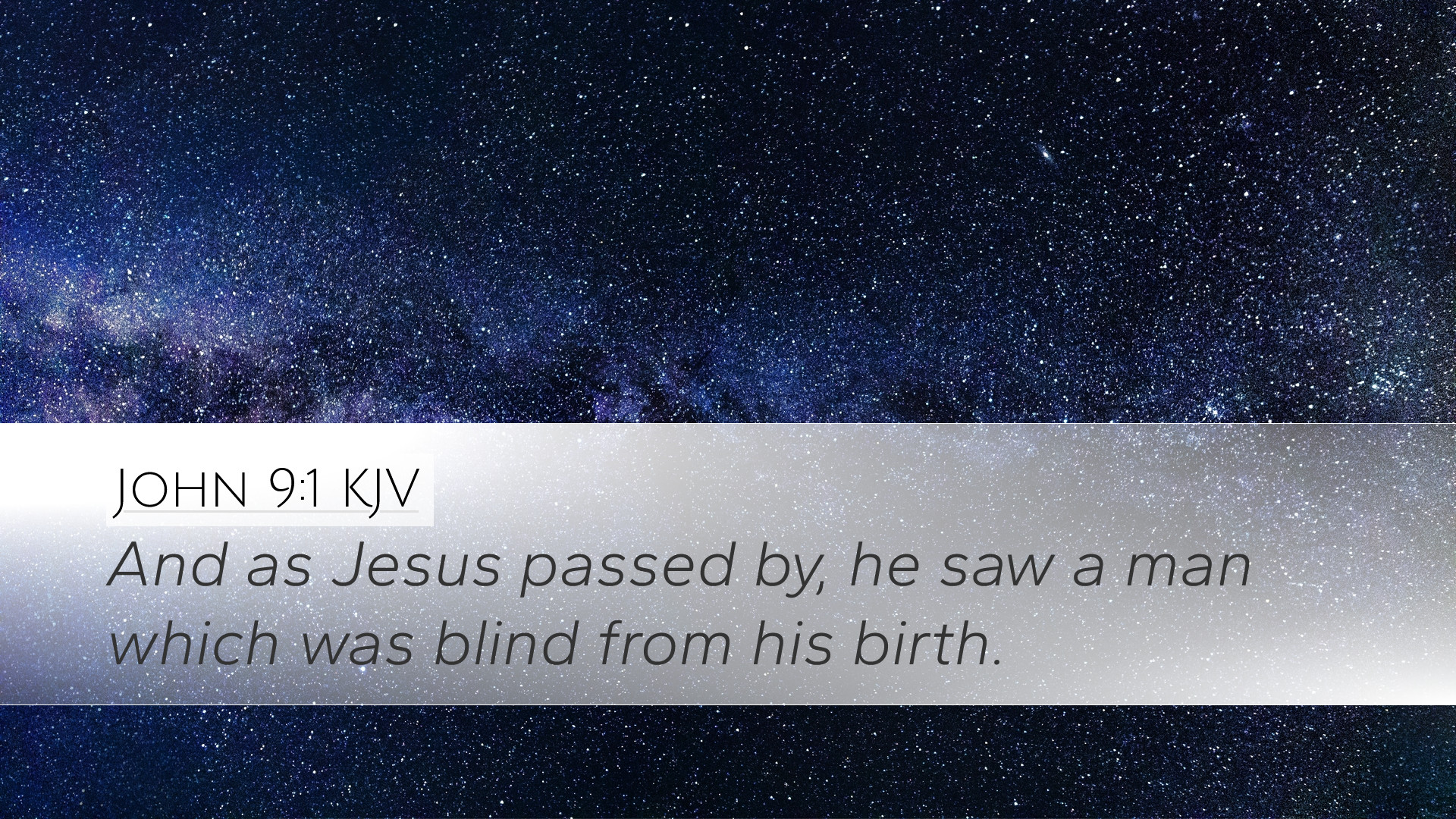Bible Commentary on John 9:1
Verse: "And as Jesus passed by, he saw a man which was blind from his birth."
Introduction
This verse, embedded within the larger narrative of John’s Gospel, sets the stage for one of Jesus' most profound miracles - the healing of a man born blind. It reflects the themes of spiritual insight, the nature of human suffering, and the divine compassion of Christ.
Contextual Analysis
John 9:1 marks the beginning of a significant event in the life of Jesus, transitioning from his previous teachings to a miraculous act. These moments are crucial for understanding Jesus' mission and the nature of His messianic identity.
Background of Blindness
This man being blind from birth exemplifies one of the deepest forms of human limitation and suffering, serving as a metaphor for spiritual blindness. In the context of the first-century Jewish community, blindness was often associated with sin, thereby raising the question of the man’s or his parents' wrongdoing, a theme that resonates throughout the chapter.
Insights from Commentators
Matthew Henry
Matthew Henry emphasizes the providence of God in this man's life. He interprets the blindness not merely as a physical handicap but as a backdrop to display the power of Christ. Henry states that Jesus notices the man as He passes, highlighting divine initiative in seeking out the lost and marginalized. The act of healing is framed within the broader context of salvation, illuminating not only sight for the blind man but also enlightening the spiritual perception of the witnesses.
Albert Barnes
Albert Barnes focuses on the significance of Jesus "passing by". He suggests that this incident illustrates God’s attention to the downtrodden. Barnes notes that the verb "saw" implies more than just physical observation; it conveys an intimate and sympathetic understanding of the man’s plight. The act of Jesus seeing him signifies divine compassion and the unfolding plan of salvation. Barnes further mentions that this miracle points to the deeper spiritual truths regarding the condition of humanity and the necessity of Christ for true illumination.
Adam Clarke
Adam Clarke brings a scholarly depth to the analysis of this verse by discussing the cultural and theological implications of blindness in ancient times. He reviews the Jewish perception of disability and its connections to sin, thus preparing the reader to understand the subsequent inquiry about the cause of the man’s blindness. Clarke insists that this moment is crafted to lead into a discourse on spiritual blindness, firmly establishing that Jesus comes into the world to give sight to the blind, both physically and spiritually.
Theological Reflections
This verse highlights several key theological themes essential for understanding Jesus's ministry:
- Divine Sovereignty: The intersection of Jesus with a blind man signifies God's sovereignty over existence and human suffering.
- Human Condition: The emphasis on blindness from birth invites significant reflection on the human condition, portraying a profound need for redemption.
- Christ's Compassion: This moment underscores Jesus' compassion, portraying him as attentive to human suffering.
- Miracle as Revelation: The impending miracle is not just an act of healing but a revelation of Christ’s messianic identity and the incarnation of divine grace.
Practical Applications
The insights from John 9:1 are particularly relevant for pastors, students, and theologians:
- Empathy in Ministry: Understanding Christ's compassion invites deeper empathy in pastoral care, recognizing the struggles of those who are marginalized.
- Spiritual Insight: Helps remind church leaders to discern spiritual blindness in their communities, aiming to offer guidance and spiritual sight.
- Faith and Healing: The narrative encourages faith in Christ as the source of healing, fostering hope for those in despair.
Conclusion
John 9:1 serves as a foundational verse in understanding Jesus’ mission. Through the lens of multiple commentaries, this verse speaks powerfully to themes of suffering, divine compassion, and spiritual insight. As believers reflect on this passage, they are called to recognize Jesus not only as a healer of physical ailments but as the light that dispels spiritual darkness in the lives of all who seek Him.


